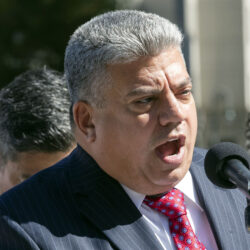
NYC Opera Reaches Tentative Deal With Union
La Traviata To Open Feb. 12 at BAM
By Verena Dobnik
Associated Press
NEW YORK — In a last-ditch effort to save one of America’s cultural institutions, unions representing the New York City Opera have reached tentative agreements that could pump new life into a company teetering on the financial brink.
“New York City Opera is open for business,” General Manager George Steel announced yesterday. “We are thrilled to be able to present innovative opera with the best artists in the world.”
In a statement, he said the proposed new contracts will “ensure our financial solvency.”
Rehearsals were to start immediately for a Feb. 12 opening production of Verdi’s La Traviata at the Brooklyn Academy of Music, said City Opera spokesman Risa Heller.
Earlier this month, rehearsals were suddenly canceled and management announced a lockout after a bitter contract dispute that has dragged on since last year.
Members of the orchestra and chorus, plus principal singers, stage managers and assistant directors, have until 4 p.m. today to vote on the three-year contract. The City Opera board also must approve.
“This is a good day for our singers, dancers and production staff,” said Alan Gordon, national executive director for the American Guild of Musical Artists that represents the chorus, stage directors and principal singers.
Local 802 of the American Federation of Musicians represents the orchestra.
The progress sheds some light on a labor impasse that threatened to decimate an institution that once nurtured talents such as Renee Fleming, Beverly Sills and Placido Domingo.
The company moved out of its longtime home at the Lincoln Center for the Performing Arts last year, citing financial troubles. Its usual schedule was cut back to 16 shows of four productions at various venues around New York, down from 13 productions in its last full season at Lincoln Center in 2007-2008.
The musicians rejected the previous offer, saying the financially diminished company didn’t guarantee work or pay. Steel responded that City Opera faced “economic constraints” and could only afford to pay people “for the work that they do.”
Under the proposed contracts, the company promises to offer “core” health plans for at least another year, then insurance contributions. In addition, a labor-management committee is to be formed “that will address artistic, planning and fund-raising issues.”
Neither side divulged wage details.
Under a contract management proposed in early December, the musicians’ average annual income would have dropped from about $40,000 to as little as $5,000 for two productions. For decades, musicians were guaranteed at least 22 weeks’ work.
City Opera’s troubles started about a decade ago with multimillion-dollar deficits, followed by the appointment of Belgian director Gerard Mortier as general manager and artistic director, effective as of the 2009-2010 season. Accustomed to staging expensive, cutting-edge extravaganzas in Europe, he insisted that City Opera’s theater be renovated, forcing the company to go dark for the 2008-2009 season, with only six unstaged performances elsewhere.
The economy’s free-fall was a last straw for the 69-year-old company.
Income from tickets during the dark season plunged to about $186,000, down from $12 million. And the company raided its endowment to the tune of tens of millions of dollars.
Mortier resigned from his position about six months before he was officially to start, on grounds that the operating budget had dwindled.
Leave a Comment
Leave a Comment


